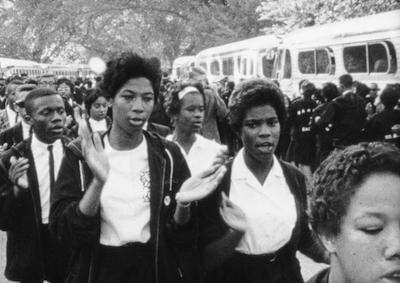Restoration world premiere!
Hey, Mama
U.S., 1968
In 1967, Vaughn Obern, a white student filmmaker attending UCLA, went to the African American neighborhood known as Oakwood, a.k.a. “Ghost Town” in Venice, California, with the intention of making a documentary about a non-profit assisting the economically-depressed area. However, he soon learned, in his words, that the topic was “pretty dull, as they [the non-profit] weren't doing [enough].” Against this backdrop, Obern began production on his cinéma vérité documentary about Black life in impoverished Oakwood. Over several months of filming, Obern became a fixture at homes and gatherings, gradually gaining the friendship and trust of many area residents. In a 1969 interview with the Christian Science Monitor, Obern spoke of his aspiration for the work, stating, “I tried to make the film as accurate as I could. I realize that I have a bias; I tried to get rid of it.” Upon completion, Hey, Mama went on to win second prize in the documentary category of the Fourth Annual National Student Film Festival in 1969—where judges included film critic Andrew Sarris and filmmaker D. A. Pennebaker. The short would be distributed on 16mm prints to schools and repertory houses by the Creative Film Society into the mid-1970s.
Given the inherent complexities involved in filming across cultural and racial boundaries in the dynamic late-1960s, Obern’s film represents both a white outsider’s view requiring critical reading and an earnest attempt to present a realistic slice of life in Oakwood. As a vital historical record, the film gently engages Oakwood’s residents, giving them agency while documenting the area’s untenable conditions of poverty created by a climate of gross socio-economic oppression, white supremacy and racism.
—Mark Quigley
16mm, b&w, 17 min. Producer/Director: Vaughn Obern. Cinematographer: Peter Jensen. With: Lavertice Lewis, Leonard McAdoo, the People of Venice, California. Restoration funding provided by the National Film Preservation Foundation.
Restored by the UCLA Film & Television Archive from the 16mm dupe picture negative and a 35/32 original track negative. Laboratory services by FotoKem, Audio Mechanics, DJ Audio, Inc., Simon Daniel Sound.
Restoration world premiere!
The Bus
U.S., 1965
Of the many defining moments that symbolize the seismic activism of the civil rights movement, the March on Washington for Jobs and Freedom in the Summer of 1963 was among the most impactful, representing one of the largest human rights rallies ever recorded in the United States, with over 200,000 participants. In the acclaimed vérité documentary The Bus, American Society of Cinematographers Lifetime Achievement Award-winner filmmaker Haskell Wexler (Medium Cool) brings a sociological sample of the sea of humanity at the March into sharp focus, capturing the impressions of a diverse group of individuals as they travel to stand in the shadow of the Washington Monument to demand equality for African Americans.
Produced and photographed by activist Wexler with a skeleton crew composed of filmmakers Nell Cox and Mike Butler, The Bus begins in San Francisco as an integrated collective organized by the Congress of Racial Equality (CORE) embarks on a three-day cross-country road trip to join the March. Employing a 16mm Auricon sync-sound camera and a raw, unobtrusive shooting style, Wexler and crew are never acknowledged (or seemingly noticed) by his subjects as quiet moments and charged conversations collide. In a series of remarkable, understated sequences, Wexler chronicles interactions between the passengers, some mundane, some profound, such as when one older Black rider calmly details how he narrowly escaped being murdered by a white mob during civil unrest in D.C. many years earlier. The collective result of these scenes is a film of consequence, comprised of small, extraordinary moments that serve as an essential record of some of the everyday faces and voices behind a watershed moment in the history of the United States.
—Mark Quigley
35mm, b&w, 63 min. Producer: Haskell Wexler. Cinematographers: Haskell Wexler, Mike Butler, Nell Cox (credited as Nel Cox).
Restoration funding provided by the National Film Preservation Foundation. Restored by the UCLA Film & Television Archive from the original 16mm A/B camera negatives, a 35mm dupe picture negative and a 35mm print. Laboratory services by The PHI Stoa Film Lab, Roundabout Entertainment, Inc., DJ Audio, Inc., Simon Daniel Sound. Special thanks to Rita Taggart.






 Mobile Navigation
Mobile Navigation

